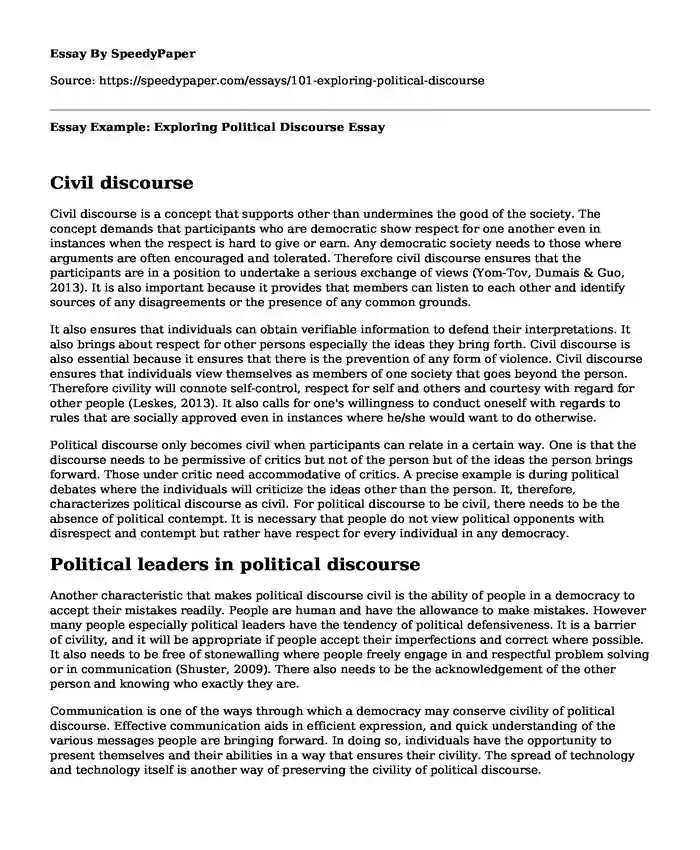
| Type of paper: | Essay |
| Categories: | Leadership analysis Political science |
| Pages: | 3 |
| Wordcount: | 623 words |
Civil discourse
Civil discourse is a concept that supports other than undermines the good of the society. The concept demands that participants who are democratic show respect for one another even in instances when the respect is hard to give or earn. Any democratic society needs to those where arguments are often encouraged and tolerated. Therefore civil discourse ensures that the participants are in a position to undertake a serious exchange of views (Yom-Tov, Dumais & Guo, 2013). It is also important because it provides that members can listen to each other and identify sources of any disagreements or the presence of any common grounds.
It also ensures that individuals can obtain verifiable information to defend their interpretations. It also brings about respect for other persons especially the ideas they bring forth. Civil discourse is also essential because it ensures that there is the prevention of any form of violence. Civil discourse ensures that individuals view themselves as members of one society that goes beyond the person. Therefore civility will connote self-control, respect for self and others and courtesy with regard for other people (Leskes, 2013). It also calls for one's willingness to conduct oneself with regards to rules that are socially approved even in instances where he/she would want to do otherwise.
Political discourse only becomes civil when participants can relate in a certain way. One is that the discourse needs to be permissive of critics but not of the person but of the ideas the person brings forward. Those under critic need accommodative of critics. A precise example is during political debates where the individuals will criticize the ideas other than the person. It, therefore, characterizes political discourse as civil. For political discourse to be civil, there needs to be the absence of political contempt. It is necessary that people do not view political opponents with disrespect and contempt but rather have respect for every individual in any democracy.
Political leaders in political discourse
Another characteristic that makes political discourse civil is the ability of people in a democracy to accept their mistakes readily. People are human and have the allowance to make mistakes. However many people especially political leaders have the tendency of political defensiveness. It is a barrier of civility, and it will be appropriate if people accept their imperfections and correct where possible. It also needs to be free of stonewalling where people freely engage in and respectful problem solving or in communication (Shuster, 2009). There also needs to be the acknowledgement of the other person and knowing who exactly they are.
Communication is one of the ways through which a democracy may conserve civility of political discourse. Effective communication aids in efficient expression, and quick understanding of the various messages people are bringing forward. In doing so, individuals have the opportunity to present themselves and their abilities in a way that ensures their civility. The spread of technology and technology itself is another way of preserving the civility of political discourse.
Technology helps in enhancing communication and the dissemination of information. Therefore using technology as a means of spreading civility aids in reaching as many people as possible to ensure that they get an understanding of civil discourse. Enlightenment is also another way of safeguarding civil discourse where the more people gain an awareness of it and its advantages; the easier it is for them to put the concept into practice. Therefore, civility ensures that there are peace and understanding among individuals of a given democracy.
References
Leskes, A. (2013). A plea for civil discourse: Needed, the academy's leadership. Liberal Education, 99(4).
Yom-Tov, E., Dumais, S., & Guo, Q. (2013). Promoting civil discourse through search engine diversity. Social Science Computer Review, 0894439313506838.
Shuster, K. (2009). Civil Discourse in the Classroom. Southern Poverty Law Center (NJ1).
Cite this page
Essay Example: Exploring Political Discourse. (2018, Nov 21). Retrieved from https://speedypaper.com/essays/101-exploring-political-discourse
Request Removal
If you are the original author of this essay and no longer wish to have it published on the SpeedyPaper website, please click below to request its removal:
- Illness & Loss - Free Essay on Grief
- Criminal Law Foundations Evaluation in Our Free Essay
- Free Essay Answering How The Crucible Is an Allegory for McCarthyism
- Annotated Bibliography Example on Tourism Industry in UK, Free Example for You
- Annotated Outline and Annotated Bibliography
- Essay Sample on Policy Analysis Framework: Alternative Policy
- Essay Sample on Debating Terrorism and Counterterrorism
Popular categories




